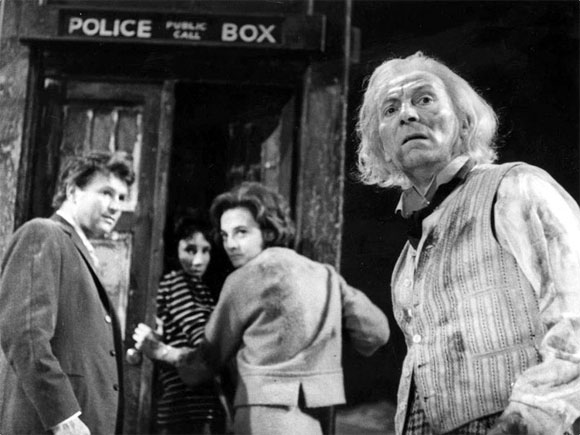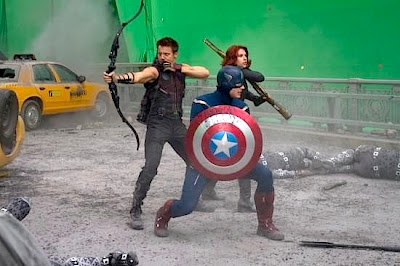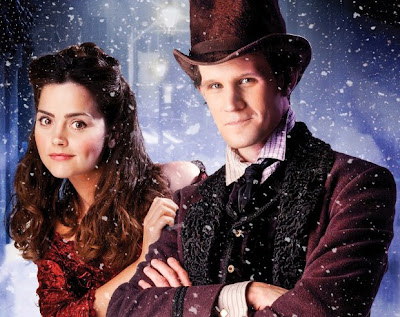Earlier this year I had the opportunity to talk with Waris Hussein, the director of the initial ten episodes of
Doctor Who, shortly before a special screening of
An Unearthly Child, the very first episode of the series.
Doctor Who debuted in black and white on the BBC on November 23, 1963 in the direct shadow of President John F. Kennedy's assassination. The episode introduced the world to the mysterious grandfatherly Time Lord known only as the Doctor, played by William Hartnell, and his iconic time machine the TARDIS.
In my one-on-one interview, Hussein revealed what was involved for
Doctor Who to make its mark at a time when televised sci-fi was unheard of in the UK, as both a science fiction series that not only preceded
Star Trek to the airwaves by nearly three years, but was also intended to educate children.
We discussed William Hartnell, the first actor to portray the one of the eleven incarnations of the Doctor on TV, whose initial take was that of a sinister Time Lord who also happened to have a granddaughter. Hussein was forthcoming on Hartnell's initial reluctance to take on the role, the hurdles they had to overcome in 1963, and gladly shared his thoughts on the still standing legacy of the show.
Shortly following our interview below,
An Unearthly Child was screened for a packed audience at
New York's Paley Center for Media, where he also provided live commentary and participated in a Q&A with the fans. He noted that the episode was a multi-camera live-to-tape shoot on the smallest set the BBC had to offer, a converted warehouse. With a mere single day shooting schedule and a budget of £2000, there was little time for elaborate blocking or retakes.
It's also worth noting that BBC announced in August production on
An Adventure In Space and Time, a 90-minute TV movie that will chronicle the show's genesis and the various figures involved in
Who throughout the years. As part of
Doctor Who's 50th Anniversary, we will see many of the behind-the-scenes events spoken about here brought to life on the small screen.
Please set the scene for us when you were approached for
Doctor Who. What was the state of televised science fiction like in 1963 Britain?
HUSSEIN: Very very little was known about science fiction apart from the films we actually got from America. I don’t think Britain had many approaches to the subject. I think Doctor Who was one of the very first. All the science fiction we saw were from movies that came out from here.
What was your first reaction to the driving concepts behind
Doctor Who?
HUSSEIN: Never skepticism, some degree of intrigue and uncertainty. It’s a very eccentric idea if you think about it. What everyone says about it, and followed later I know by Star Trek, they were all set in ships and things that went into the universe and the outer regions. This is a telephone box which opens into a vast ship. How eccentric can you get? That itself was an intriguing subject matter, and then of course the characters. We should not forget that its not just science fiction, its an educational situation. We were trying to, through this medium and through this format, educate kids by doing one episode in the past and one episode in the future. That’s what the first one was: Fire. Looking for fire. That sort of thing. Then you enter the Daleks, and then you have the second lot which was about the travel across Europe getting to China (Cathay in those days), with Marco Polo. So one after the other, and that format still exists as we know, with much more embellishment.

So among other things,
Doctor Who was conceived as televised history lesson for children?
HUSSEIN: Yes, but not to give them lectures, to give them stories with an adventure behind it as well. Marco Polo taught kids all about a civilization that they probably never would have herard about other than that. You know, China.
The backstory regarding the broken chameleon circuit of the TARDIS has given
Doctor Who a unique and now iconic association with the series. Was it from day one always the idea, budget contraints or not, to have the TARDIS permanently remain a police box?
HUSSEIN: This was Sydney Newman who created it, his original idea and was to my mind, genius. Who else would come up with something like this? I think it's brilliant. They are more or less diminished now. In fact it's become an iconic image.
Even at the show's inception, was the Doctor always referred to as only 'the Doctor'? Was there ever a name on even the earliest of the scripts you saw?
HUSSEIN: Never given a name, and that is still kept to this day.
The show in the last year has had many cryptic plot points teasing what the Doctor's actual name is, repeatedly playing with the question: "Doctor who?" Revealing the 'who' seems to spell catastrophic consequences for the universe.
HUSSEIN: Well I sincerely hope they don’t because there is a kind of mystery attached to this character. He’s been portrayed in many ways now, but I don’t think he’s a human being you see, and I don’t think they should make him totally human. He should be unpredictable, and that’s my feeling. That’s how it started anyway.

What was it like working with William Hartnell as the Doctor?
HUSSEIN: William was an eccentric actor as well as a character. He was very conservative in many ways in his approach to life. I think he was somewhat taken aback when he confronted a woman producer [Verity Lambert] because he was very much a male oriented person. And then a British Indian [director] for Heaven’s sakes! I was the very first Indian ever to be doing what I am doing. And I think it must have been a very unusual set of people that he confronted. We had to woo him and persuade him to be a part of the team. I have to say I am happy he did become a part of it, we was a very good actor.
What was the reception to the show when it aired?
HUSSEIN: The first airdate was the same date when President Kennedy was assassinated, so there was a pall that descended on everything and the BBC had to repeat it. So I think as a result in an odd way we manged to pull ourselves out of this period and it was seen as an innovative show. I think a lot of people reflected this in their reaction. Thinking 'You know, maybe we are facing something unusual and there is a future in it.'
Do you have any particular favorite incarnations of the Doctor or
Who moments from over the years?
HUSSEIN: I am reluctant to pinpoint things. I left it after the Marco Polo episodes, and I went on to do other things. So it was rather like giving birth, getting the kid adopted and moving on (laughs). Let someone else carry on the education. It's not easy to pinpoint and say 'Oh by the way I really like so and so,' because I think its unfair in many ways. Each story had its own embellishment and its own creativity. There have been incredible Doctor Who's subsequent, and also to my mind some that didn’t work out. As we know the show at some point was put to bed, and it was only revived by Russell T. Davies. So I do not like to pinpoint, I just think that it's great that it's still going.
What was it like shooting simultaneously with multiple cameras in a studio in addition to the limited visual effects of the time? Did that force you to be more creative?
HUSSEIN: We had none of the facilities of today. Forget computer generated stuff. We had to literally be inventive of what we did. Sand storms by interfering electronically on the monitor. The opening titles of Doctor Who were all shooting into monitors from one camera to another. That's why you get that strange wiggly effect. That's the kind of thing we had to be inventive of about. It was a whole different landscape that we worked in. We were pioneers, and what followed was the growth of something we planted.
Were two versions of the episode produced?
HUSSEIN: No. The pilot and then the main one. The first episode was the one after the pilot. Not two pilots, just the first. There were certain things we kept from the pilot. The script didn't change radically, but certain characteristics changed. We softened the Doctor, we did certain things like that. Dealt with Susan the granddaughter is a different way. Syndey Newman oversaw it and he was there as creator of the show.
What do you expect from revisiting the episode all these years later tonight, plus providing live commentary to the audience? Is is hard to not rethink your work differently now in your head?
HUSSEIN: Absolutely. Gosh yes. I'm sure to be cringing tonight watching what I did. You know, it's bound to happen isn't it? I have not seen it for a very long time. In a funny way I have just not gone back to it. It's like revisiting something you have a pleasurable memory about. Well tonight we'll see it, and will see.
Are you looking forward to the the 50th Anniversary next year?
HUSSEIN: Absolutely. Yes, I hope they do something splendid with it.









































